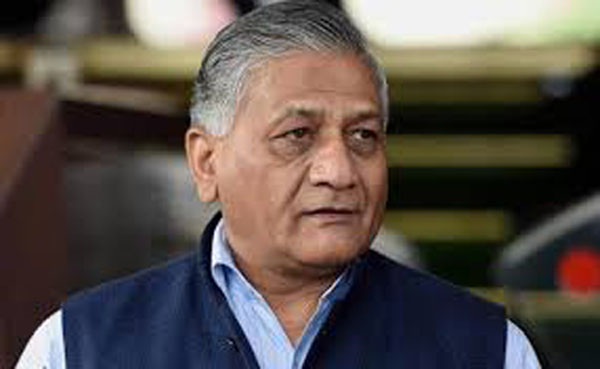India Reaches Out To North Korea: Gen. VK Singh, Minister Of State For External Affairs, To Visit Country
The development comes at a time when North Korea has criticised the US approach towards Pyongyang, and has lashed out at the US-South Korean military exercises.
May 17, 2018
Minister of State for External Affairs VK Singh
At a time when North Korea is being engaged by the international community, India has reached out to Pyongyang, with the first minister-level visit to the country in 20 years coming on May 15 and 16, Korean Central News Agency reported on Wednesday. Hours later, the Ministry of External Affairs (MEA) confirmed Minister of State (MoS) for External Affairs V K Singh’s “official visit”.
The last minister to visit Pyongyang was Mukhtar Abbas Naqvi, then MoS for I&B, to attend the sixth Pyongyang Film Festival in September 1998. While there was no meeting between V K Singh and North Korean leader Kim Jong Un, he held discussions with four leaders in the North Korean establishment: Vice President of Presidium of the Supreme People’s Assembly, Kim Yong Dae, Foreign minister Ri Yong Ho, Culture minister Pak Chun Nam, and Vice Foreign minister Choe Hui Chol.
They discussed a broad range of issues covering political, regional, economic, educational and cultural cooperation between the two countries, the most important element from the Indian perspective being North Korea’s assurance that it will “never allow any action that would create concerns for India’s security”. This is in the context of the North Korea nuclear programme having links with Pakistan’s nuclear programme, developed by disgraced nuclear scientist A Q Khan.
In a statement, the MEA said, “MoS (Minister of State) highlighted the threat from nuclear proliferation, in particular India’s concerns in the context of the proliferation linkages with India’s neighbourhood. The DPRK (North Korean) side emphasized that as a friendly country DPRK will never allow any action that would create concerns for India’s security.” Besides bilateral discussions, the MEA said the North Korean side provided an overview of some recent developments in the Korean Peninsula. “MoS (Singh) reiterated India’s support to the joint peace initiative of DPRK and Republic of Korea leadership, encouraging both sides for their efforts towards establishment of peace and prosperity on the Korean Peninsula,” the statement said, without any reference to the US-North Korean engagement.
The development comes at a time when North Korea has criticised the US approach towards Pyongyang, and has lashed out at the US-South Korean military exercises. This is being perceived as a fresh irritant, ahead of the scheduled summit between Kim Jong Un and US President Donald Trump. This comes after a series of provocative statements by US officials, especially NSA John Bolton and Secretary of State Mike Pompeo, in the last few days.
India’s outreach to Pyongyang comes in the wake of global efforts to curb the nuclear proliferation threats emerging from North Korea. On March 9, a day after US President Donald Trump agreed to meet Kim Jong Un, India had “welcomed” the development and said it “supports” all efforts to bring about peace and stability in the Korean Peninsula through “dialogue and diplomacy”.
“India supports all efforts to bring about peace and stability in the Korean Peninsula through dialogue and diplomacy. We hope that such engagement will help in reducing tension and pave the way for lasting peace and reconciliation in the Korean Peninsula. As we have said before, we also believe that any solution to the issues in Korean Peninsula must also take into account and address concerns about the proliferation linkages of DPRK’s nuclear and missile programme,” MEA’s official spokesperson Raveesh Kumar had said, in a reference to links between Pakistan’s nuclear programme and the North Korean nuclear and missile programme.
India has always maintained that Pakistan’s nuclear scientist A Q Khan had helped North Korea in developing their nuclear programme. In the last few years, especially since Trump administration came to office, New Delhi had played along with Washington on the sanctions imposed on North Korea.
However, US insistence of reducing North Korean diplomatic presence in India, as well as Indian diplomatic presence in Pyongyang, had been gently rejected by the Indian establishment. External Affairs Minister Sushma Swaraj had said publicly, with then US Secretary of State Rex Tillerson by his side in October 2017, that “embassies of some of US’ friendly countries should remain there so that some channels of communication remain open”.
India has, however, always maintained diplomatic and trade relationship with North Korea. North Korean Foreign minister Ri Su Yong had visited India on a bilateral and standalone visit from April 12 to 14, 2015 and had sought humanitarian assistance.
On Wednesday, the MEA said, “The two sides decided to explore possibilities of cooperation in areas of mutual interest, including vocational education, agriculture, pharmaceuticals, promotion of Yoga and traditional medicines. Both sides agreed to strengthen people-to-people contacts through educational and cultural exchange, to mark 45 years of establishment of diplomatic relations between the two countries.”
India and North Korea established formal diplomatic relations on December 10, 1973 and this year marks the 45th year of establishment of diplomatic relations. Bilateral trade between India and North Korea has declined in recent past mainly due to the latter’s inability to carry on foreign trade due to financial crunch. India had been North Korea’s second biggest trade partner after China.
Courtesy: Indian Express

